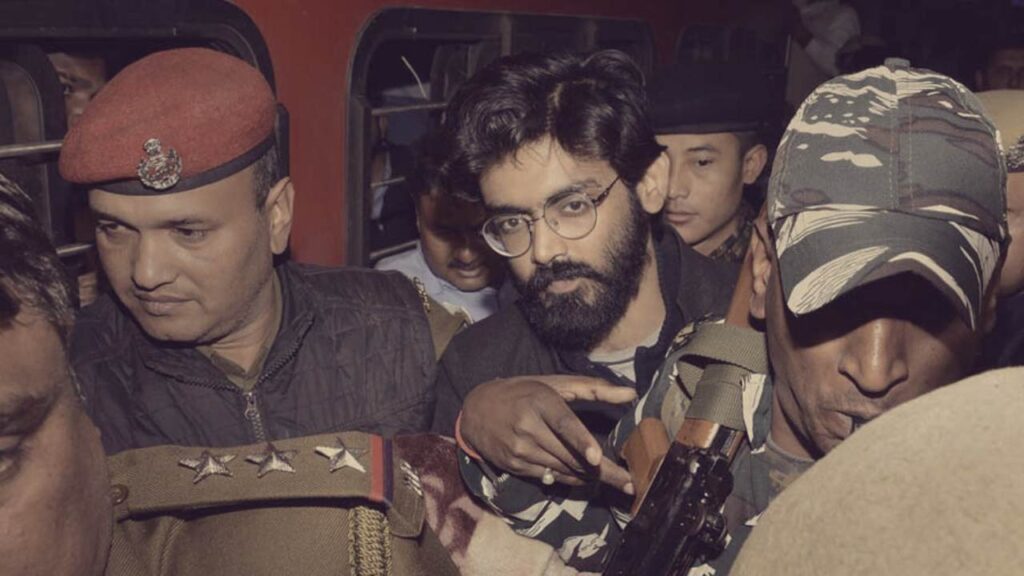A Delhi Court refused to grant statutory bail to Sharjeel Imam in a sedition and Unlawful Activities Prevention Act (UAPA) case on Saturday, February 17, 2024. Sharjeel was arrested during the CAA-NRC protest over allegations of making inflammatory speeches in Delhi and Aligarh Muslim University.
The court did not find any direct involvement by him in inciting violence or murder through his speeches against the Citizenship Amendment Act (CAA). However, the court claimed that his rhetoric had a significant mobilizing effect and potentially played a role in inflaming the February 2020 riots. The court noted, ‘Although the applicant did not explicitly call for violence, his speeches and activities mobilized the public, disrupting the city and possibly contributing to the outbreak of riots.’

It further noted that the contents of Imam’s anti-CAA speeches at Jamia Millia Islamia and Aligarh Muslim University (AMU) could be termed ‘seditious’ in the dictionary meaning, stating that he ‘skillfully manipulated the facts and incited the public to create chaos throughout the city,’ influencing ‘a particular community’ to engage in disruptive activities. ‘… if the acts and actions of the applicant are considered, in a normal dictionary meaning, they can be termed seditious,’ held Additional Sessions Judge Sameer Bajpai of Karkardooma Courts.
Read more: https://foej.in/jail-year-four-how-many-more/: Sharjeel Imam Case: Delhi Court Denies Statutory BailIn January 2020, Imam was arrested and applied for bail in July 2022. Later, Section 13 of the UAPA was invoked against him. He has been in judicial custody since January 28, 2020. His lawyers argued that he had already spent four years in jail out of the maximum sentence of seven years, entitling him to statutory bail. Mustafa contended that Imam should be released on statutory bail under Section 436 of the CrPC, having served half of the maximum punishment for UAPA offenses. Despite the prosecution’s argument regarding the temporary stay on sedition charges, Mustafa emphasized the Supreme Court’s order, stating that the stay remains until the constitutional challenge is resolved. Additionally, Imam’s counsel asserted that bail under Section 436A is mandatory, with the court’s discretion limited to assessing trial delays attributable to the accused.
Amit Prasad, the Special Public Prosecutor (SPP), argued that bail cannot be granted based solely on the temporary stay on Section 124A (sedition), which carries a maximum sentence of life in prison. The SPP further contended that, given the seriousness of the offense, the court should be permitted to reject the bail if warranted. The court acknowledged the exceptional circumstances of the case, allowing for further detention if warranted. It noted: ‘The court does not agree with the learned SPP that, at this time, while considering the bail application under Section 436A Cr.P.C., the court can consider the period of imprisonment as prescribed for the offense under Section 124A IPC, i.e., imprisonment for life.’

While the court rejected the prosecution’s claim that the severity of the sedition charge should impact bail consideration, it pointed out that in this case, the circumstances were not normal but indeed exceptional. Furthermore, the Delhi High Court had ordered the trial court to expedite its decision regarding his bail plea, and that order was implemented in the trial court’s decision. The Delhi High Court will hear Imam’s plea against the filing of charges on March 8.
Human rights advocates have emphasized that BJP politicians who publicly made inflammatory anti-Muslim remarks have escaped justice, while anti-CAA demonstrators have been jailed for the violence that ensued.


